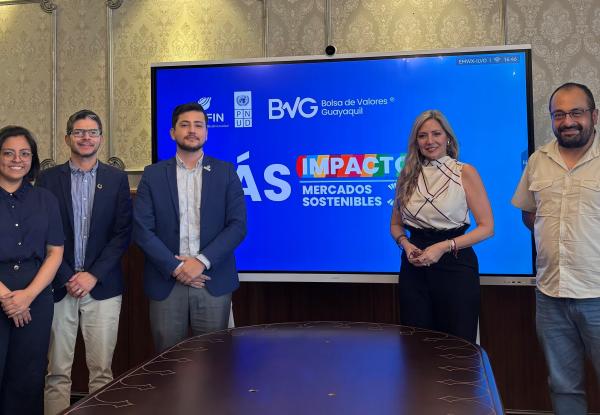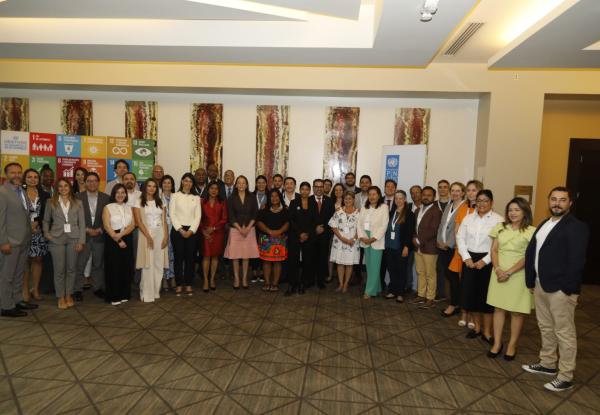Ecuador
Ecuador is considered one of the most biodiverse countries in the world (one of the 17th most diverse), due to the high diversity of their natural species. The country has around 23.056 taxonomic species of animals and plants reported, which constitutes the 6,1% of all species reported worldwide. This biodiversity richness is determined by its geographical, atmospheric and climatic location and conditions and represents an important economic and commercial source, especially for the communities living and relying on this mean. Besides that, the country's economy is based on non-renewable resources such as oil, and on traditional agriculture such as the production of bananas, shrimps, cocoa, flowers and fisheries. These activities may endanger the highlighted biodiversity richness of the country, which makes necessary to look for new alternatives on sustainable development that support the protection and conservation of biodiversity in the country.
As part of this effort, the United Nations Development Programme, through BIOFIN is working in coordination with the Ministries of Environment and Water, Finance, and the National Secretariat for Planning and Development. BIOFIN in Ecuador has analyzed the legal and institutional framework, reviewed biodiversity expenditures from the public and private sector, as well as identified funding needs and the financial gaps to implement measures and actions until 2021. On this basis, the resource mobilization plan identifies different financial sources, modalities and mechanisms that can contribute to fulfill the national objectives related to the sustainable management of biodiversity.
In this context, Ecuador is boosting a "bioeconomy" policy that will allow the country to build a more sustainable economy based on innovation and circularity. Therefore, BIOFIN has played an important role by developing and implementing financial solutions that tackle strategic processes, instruments and initiatives on this matter; such as: corporate social responsibility, private financial sector engagement, efficiency of public expenditures and sustainable entrepreneurship.
Within this framework, the National Strategy of Biodiversity 2015 - 2030 was elaborated by the Ecuadorian Government in order to plan integrated actions that contribute to the more accurate management and use of the natural resources within a sustainable development framework. Then, in order to support the implementation of the National Strategy of Biodiversity and its Action Plan for 2016-2021 (NBSAP), the Government of Ecuador together with the BIOFIN initiative developed a Biodiversity Finance Plan (BFP) to mobilize financial resources that will contribute to increase investments from the public and private sector at the national level, as well as from international cooperation. This Action Plan is looking to meet the objectives of knowing, valuing, protecting, restoring and using biodiversity in a sustainable way in Ecuador.
Furthermore, additional support has been given to the Ecuadorian government to build the Organic Environmental Code which is the legal instrument that unifies and updates all the environmental regulation of the country. Furthermore, BIOFIN has supported the creation and operation of the Fund for Sustainable Environmental Investments (FIAS for its Spanish acronyms) in order to access and better manage international cooperation donations for biodiversity conservation. Finally, important assistance was given to identify a raw water tariff that promote the mobilization of resources for biodiversity conservation from local governments.
- Biodiversity Finance Plan (BFP) to mobilize financial resources that will contribute to increase investments from the public and private sector at the national level, as well as from international cooperation.
- Social Responsibility and Sustainability Investment Fund, included in the National Environment Fund, which facilitates the business sector investments in biodiversity
- Promotion of financial mechanisms for protected areas and surrounded areas, such as technical advice for entry fees and water tariffs; involvement of private protected areas; identification of tourist services related to protected areas; crowdfunding campaigns for the Galapagos Islands; among others.
- Facilitation of national processes for inclusive finances such as the National Roundtables on Sustainable Finances and Bio-Economy.
- Designing and application of green credit lines within the popular and solidarity economy in more than 500 Credit Union of Ecuador.
Finance Solution 1: Promoting technical tools for financial mechanisms based on tourism in protected areas.
This finance solution started in 2019 and it focusses on the promotion of financial mechanisms developed during the first phase of BIOFIN II in order to provide technical inputs on financial sustainability to the management and conservation of protected areas to the new administration starting in 2021.
The technical studies developed include different rates or fees from service providers that operate in situ; analyses on the charge for entrance fees to protected areas according the types of visitors; and self-sustainability fees for the maintenance of the protected area system.
The BIOFIN II extension is considering the strong negative effect of the Covid19 pandemic crisis for the Galapagos tourism activity and the inherent risk for the conservation of biodiversity, due to the reduction of important resources for the conservation of its protected areas. In this sense, technical assistance to Galapagos institutions to design other financial solutions in the tourist line and crowdfunding initiatives are being considered.
Finance Solution 2: Optimization of management models to strengthen the management and leverage of resources for biodiversity.
This finance solution started in 2019 considering the articulation among the public and private sectors, with a key role for the financial system to promote sustainable post-pandemic development.
BIOFIN continue strengthening the National Roundtable for Sustainable Finances and also promote other national processes such as the National Roundtable on Bio-economy.
BIOFIN has also promoted the application of financial mechanisms in order to endure the water provision, such as rough water tariffs for selected productive sectors.
Finance Solution 3: Impact Investment Fund for bio enterprises associated with bioindustry
Among the efforts of the private sector in Ecuador to contribute to sustainable development include Social Responsibility (SR) actions. The analysis of recent information on the subject in the country shows that the SR actions of representative companies are preferably aligned with seven standards of the Global
Reporting Initiative - GRI, which are: local communities, materials, energy, water and effluents, biodiversity, emissions, effluents and waste and, economic performance.
However, it should be noted that the contribution of actions from the private sector to national strategies for biodiversity, climate change and sustainable development has been difficult to make visible. This reveals the need and opportunity to optimize the impact of RS actions in the context of national interests.
Thus, arose the idea of creating a subaccount within the FIAS Sustainable Environmental Investment Fund, as a catalyst for SR resources from the private sector. It is in itself a private trust fund, which would welcome voluntary contributions from the business sector and other contributors aligning business interests with sustainable development and national goals for sustainable development. The proposed name of this subaccount is “Social Responsibility and Sustainability Fund (FRSS)”.
Finance Solution 4: Finance sector for biodiversity conservation
This Finance Solution looks for a coordinated work with the Finance Sector (including the Popular and Solidarity Economy) in order to promote more sustainable practices and the development of financial tools (such as green bonds) in the country.
In this sense, BIOFIN will support CONAFIPS (The National Corporation of Credit Unions in Ecuador) for an activity on Green Credit Lines in the Popular Solidarity Economy (EPS) and the implementation of Systems for Social and Environmental Risk within its more than 540 Credit Unions.
For next years it is expected to continue working with CONAFIPS and partners in the monitoring for the green loan allocations. In addition, the promotion of other financial tools with the Finance Sector (such as bonds) will be carried out. Finally, BIOFIN in Ecuador prepared a Nature Financial Disclosure Readiness Policy and Institutional Review (TNFD), including a regulatory and institutional analysis, with a view to establish an enabling environment that will allow the development of a nature related financial disclosure framework.
Finance Solution 5: Financing Strategy for biodiversity conservation in Ecuador
Closely with the Ministry of Environment, Water and Ecologic Transition (MAATE) BIOFIN works in the preparation of a coordinated Financing Strategy for Biodiversity in Ecuador, including the preparation of key technical results such as mapping of international funding for Ecuador; study on harmful subsidies to biodiversity; green credits taxonomy; and the evaluation of a green bond. These inputs have been the basis for the 2024 NBSAP updating process to be implemented until 2030 in the framework of the new Global Biodiversity Framework of the Convention on Biological Diversity (CBD)
Findings: During the recent years, Ecuador have been characterized by the strengthening of the legal and institutional framework for sustainable development, including aspects related to biodiversity protection and conservation. This progress could be summarized in the following aspects:
- Development and implementation of legal guarantees through the creation of legal instruments for the biodiversity conservation.
- Design and implementation of plans and programs for sustainable use and exploitation of biodiversity.
- Implementation of investment and funding mechanisms for activities related to biodiversity conservation,
- Implementation of environmental authorization and control systems for the execution of public and industrial projects, as well as for public works.
- Strengthening of research for innovation and technology development through public investments.
Nonetheless, gaps in programs and tendencies were identified. Its impact need to be address within the biodiversity finance strategy. These are related to the following challenges:
- Changing the primary production structure of the economy towards one basedon innovation, energy efficiency and sustainable use of biodiversity and capacity strengthening development.
- Implementing a climate change strategy led by the National Environmental Authority that allows to overcome the fact that national emissions of carbon monoxide (CO2) from fixed sources has grown close to 5% per year while mobile emissions did so by 15% per year, between 2006 and 2010. The rate is greater than the growth rates of the population (1.8%) and GDP in the same period (3%).
- Making a progressive transition towards a clean production of food based on family and peasant agriculture considering that the agroindustrial model prevailing in Ecuador through monoculture, has a high concentration of productive land and water for irrigation.
- Implementing technically designed economic and non-economic instruments which act as incentives for modifying production and consumption patterns with negative effects on biodiversity,
- Strengthening environmental regulation and institutional capacity, particularly at the level of local governments.
Findings: The historical consolidated expenditure for biodiversity in the prioritized sectors (environment, renewable and non renewable natural resources, agriculture and private sector agrarian activities) was USD 1,056.77 million, which is equivalent to 1.24% of GDP. Spending on biodiversity has doubled in the period of analysis, going from 0.11% of GDP in 2008 to 0.27% of GDP in 2014. On average, for the period 2018-2014, public sector spending on biodiversity represented 88.28%, while private agricultural sector represented 11.72%.
However, what is planned and what is actually executed differed. In addition, the identified expenditures do not necessarily take into consideration the results obtained in biodiversity for each dollar spent, which makes necessary to plan budget and interventions based on results.
Findings: To estimate the financial needs and gaps for biodiversity conservation actions, the review made by BIOFIN focused on 9 prioritized results of the National Strategy of Biodiversity and its Action Plan for 2016-2021 (NBSAP). According to the analysis, the total projected financial needs for the period 2016-2021 for biodiversity conservation actions will reach USD 2.364'487.058. On the other side, the estimated finance gap is USD 1.301'884.153 for the same period.
Findings: The finance plan for the National Strategy of Biodiversity and its Action Plan for 2016-2021 takes into account the diversification of financing sources. This measure implies the inclusion of new funding sources, such as capital shares and negotiable instruments, as well as the decentralization of environmental management to local governments. This also includes the development of financial capabilities at the parochial, cantonal and provincial level of government.
Financial targets up to 2021 are structured as follows:
- Fiscal: 55,55%
- Donations: 6,56%
- Loans: 16,58%
- Capital shares:16,39%
- Negotiable instruments: 4,92%


